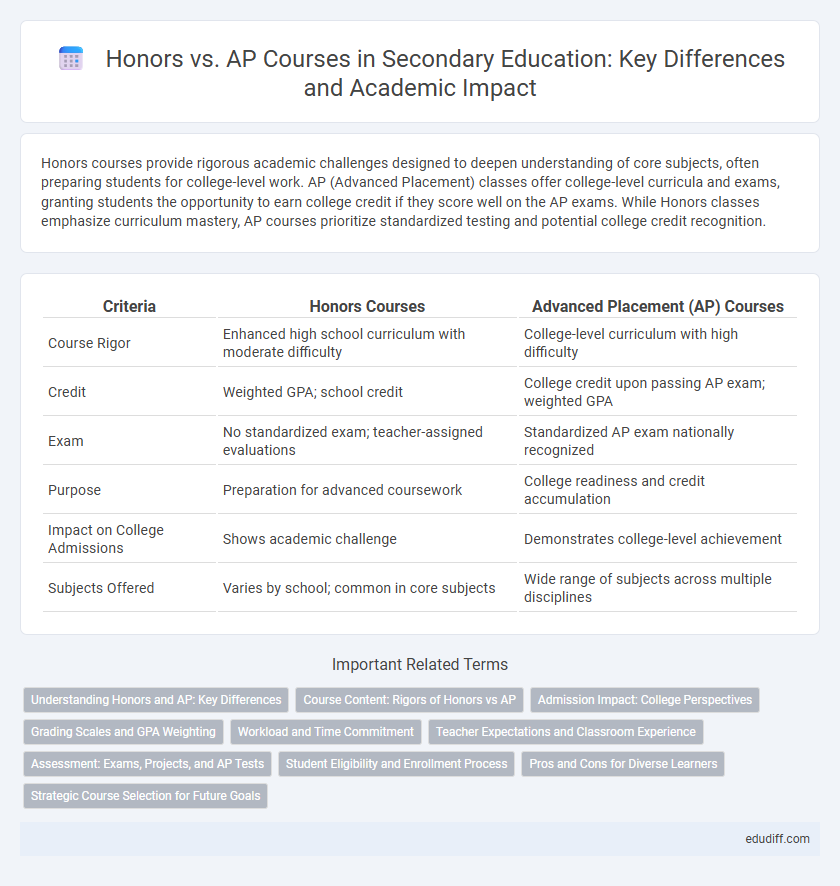Honors courses provide rigorous academic challenges designed to deepen understanding of core subjects, often preparing students for college-level work. AP (Advanced Placement) classes offer college-level curricula and exams, granting students the opportunity to earn college credit if they score well on the AP exams. While Honors classes emphasize curriculum mastery, AP courses prioritize standardized testing and potential college credit recognition.
Table of Comparison
| Criteria | Honors Courses | Advanced Placement (AP) Courses |
|---|---|---|
| Course Rigor | Enhanced high school curriculum with moderate difficulty | College-level curriculum with high difficulty |
| Credit | Weighted GPA; school credit | College credit upon passing AP exam; weighted GPA |
| Exam | No standardized exam; teacher-assigned evaluations | Standardized AP exam nationally recognized |
| Purpose | Preparation for advanced coursework | College readiness and credit accumulation |
| Impact on College Admissions | Shows academic challenge | Demonstrates college-level achievement |
| Subjects Offered | Varies by school; common in core subjects | Wide range of subjects across multiple disciplines |
Understanding Honors and AP: Key Differences
Honors courses emphasize in-depth exploration of core subjects with more rigorous assignments, while AP classes offer college-level curriculum designed to prepare students for standardized AP exams that can earn college credit. Honors classes often focus on critical thinking and subject mastery within the high school context, whereas AP courses require advanced analytical skills and time management to handle their accelerated pace. Recognizing these differences helps students choose the course that best aligns with their academic goals and college readiness.
Course Content: Rigors of Honors vs AP
Honors courses typically emphasize in-depth exploration of subject material with moderate pacing, enhancing critical thinking and analytical skills through complex assignments. AP courses demand mastery of college-level content, requiring extensive memorization, faster pacing, and preparation for standardized AP exams that can earn college credit. The rigor in AP classes surpasses Honors by incorporating comprehensive syllabi aligned with College Board standards and heightened expectations for independent research and exam readiness.
Admission Impact: College Perspectives
Colleges view AP courses as more rigorous due to standardized national curricula, often granting them higher weight in admissions decisions compared to Honors classes. AP exam scores provide quantifiable metrics that help admissions officers assess academic readiness, whereas Honors courses vary widely by school without standardized testing. Taking multiple AP classes and earning high scores can significantly enhance a student's college application by demonstrating mastery of college-level material.
Grading Scales and GPA Weighting
Honors courses typically have a 4.5 GPA weighting scale, while Advanced Placement (AP) courses often use a 5.0 scale, reflecting their increased rigor. Grading scales for Honors classes usually add 0.5 quality points per grade, whereas AP classes add a full point per grade to the standard 4.0 scale. This GPA weighting difference can significantly impact a student's class rank and college admissions prospects.
Workload and Time Commitment
Honors courses typically require a moderate workload with assignments that reinforce core concepts, demanding less overall time commitment compared to AP classes. AP courses involve rigorous study, frequent assessments, and extensive outside preparation to meet college-level standards, significantly increasing student workload and time investment. Students should evaluate their academic goals and available time before choosing between Honors and AP classes to balance challenge and manageability.
Teacher Expectations and Classroom Experience
Honors courses typically have rigorous teacher expectations focused on depth of understanding and critical thinking, encouraging students to engage with complex material through detailed discussions and analytical writing. AP classes demand adherence to a structured curriculum aligned with the College Board's exam framework, emphasizing comprehensive content mastery and consistent preparation for a standardized test. Classroom experience in Honors may feel more flexible and discussion-based, whereas AP environments are often fast-paced, exam-driven, and heavily reliant on practice tests and review sessions.
Assessment: Exams, Projects, and AP Tests
Honors courses typically include assessments such as exams and projects designed to deepen subject understanding and develop critical thinking skills. AP classes require students to prepare for a standardized AP exam that can potentially earn college credit, emphasizing a rigorous curriculum aligned with college-level expectations. Performance in Honors assessments often influences transcript GPA, while AP test scores impact college placement and credit opportunities.
Student Eligibility and Enrollment Process
Student eligibility for Honors courses typically requires a strong academic record in prerequisite subjects, while AP courses demand higher standardized test scores and teacher recommendations. Enrollment in Honors classes is usually determined by school counselors based on grade performance, whereas AP enrollment often involves a formal application process and commitment to rigorous coursework. Both paths aim to challenge students but differ in assessment criteria and enrollment logistics.
Pros and Cons for Diverse Learners
Honors courses often provide a rigorous curriculum with smaller class sizes, supporting diverse learners through more personalized attention and paced challenges. AP classes deliver college-level content and potential college credit, benefiting motivated students but can overwhelm those needing more foundational support. Diverse learners may excel in Honors classes due to differentiated instruction, while AP courses could require supplementary resources or accommodations to ensure equitable success.
Strategic Course Selection for Future Goals
Choosing Honors courses offers rigorous foundational knowledge that strengthens critical thinking and subject mastery, beneficial for many college programs. AP courses provide college-level curriculum and the opportunity to earn college credits, which can accelerate degree completion and enhance university applications. Strategic course selection should align with future academic and career goals, balancing Honors for depth and AP for credit advancement.
Honors vs AP Infographic

 edudiff.com
edudiff.com